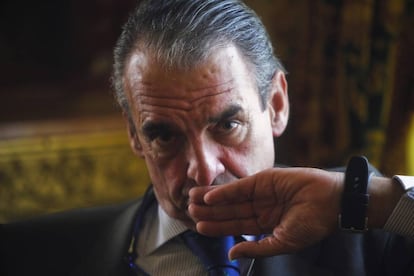Disgraced Spanish banker secretly led life of luxury
Mario Conde was hiding a yacht and numerous properties from authorities, while claiming that he had no money to pay compensation over Banesto debacle

Mario Conde, a former banker who was once part of Spain’s jetsetting crowd, used numerous ploys to avoid paying off the shareholders who were ruined by his mismanagement of Banesto.
Court papers to which EL PAÍS has had access show that Conde was living a life of luxury after serving 11 of the 20-year prison term he received following the Banesto debacle, considered the biggest financial scandal of the 1990s in Spain.
Conde was placed in preventive prison in April of this year after an investigation revealed that he may have laundered as much as €13 million back into Spain from eight different countries since 1999, despite having declared himself insolvent in order to avoid paying the compensation ordered by the courts when he was sentenced for his offenses at Banesto.
As soon as he stepped into prison for the first time, Conde began bringing back the money he had concealed abroad
The papers of the case, which is being overseen by Judge Santiago Pedraz of the High Court, show that Conde owns a yacht worth €30,000, three luxury homes in Madrid and a country home in Pollensa, on the island of Mallorca.
He also owns extensive farming estates in Andalusia and Castilla la Mancha, a company that makes dietary products, at least three luxury vehicles, €5.4 million in shares in the media group Grupo Intereconomía, and a further €9.5 million invested in a SICAV, a collective investment vehicle similar to an open-ended mutual fund.
The family also employs domestic help and chauffeurs for himself and for his children, Mario Conde Arroyo and Alejandra (the latter has been charged with managing his business network – eight companies abroad and four in Spain).
Suspicious show of wealth
Conde’s public appearances were his undoing. Watching him at book presentations and television debates, the court that had sentenced him to pay €26 million in compensation for his sacking of Banesto found that his lifestyle did not match that of a man who had returned €12 million but declared himself unable to produce any more money. A new investigation was ordered, leading to Conde’s second arrest in April of this year.
Finally, Conde earned royalties for the seven books that he has published. One of these publications alone brought him nearly €600,000. And he was making over €3,000 a month for participating in debates on the TV show El gato al agua, owned by Intereconomía.
Conde is one of the most famous bankers from the days of the Spanish “pelotazo” – an era in the late 1980s and early 1990s when financial and real estate speculation was making celebrities out of people with a nose for business and the right contacts.
He became chairman of Banesto at age 38, and his slicked-back hair and elegant dress style earned him many imitators. His meteoric career also made many people think that he was the only person capable of making a credible run for power against then-prime minister Felipe González of the Socialist Party.
Then, in 1993, the Banesto case broke. The Bank of Spain took over the lender after finding a €3.8-billion hole in its accounts, which managers were unable to explain. Conde has always declared himself innocent of all charges, and claimed that his own decision to enter politics became a matter of concern for both the Socialists and the Popular Party (PP), who decided to get him out of the way.
As soon as he stepped into prison, Conde began bringing back the money he had concealed abroad. It started in 1999 with small amounts, no more than €3,000 at a time, according to a Civil Guard investigation.
In 2008, Conde and his lawyer Francisco de Vega, who is also in custody, allegedly designed a network of companies in Spain and seven foreign countries, some of which are tax havens. The goal, according to anti-corruption investigators, was to slowly bring back the money that Conde sacked from Banesto. Although €13 million have been detected, investigators believe there could be even more.
English version by Susana Urra.
Tu suscripción se está usando en otro dispositivo
¿Quieres añadir otro usuario a tu suscripción?
Si continúas leyendo en este dispositivo, no se podrá leer en el otro.
FlechaTu suscripción se está usando en otro dispositivo y solo puedes acceder a EL PAÍS desde un dispositivo a la vez.
Si quieres compartir tu cuenta, cambia tu suscripción a la modalidad Premium, así podrás añadir otro usuario. Cada uno accederá con su propia cuenta de email, lo que os permitirá personalizar vuestra experiencia en EL PAÍS.
¿Tienes una suscripción de empresa? Accede aquí para contratar más cuentas.
En el caso de no saber quién está usando tu cuenta, te recomendamos cambiar tu contraseña aquí.
Si decides continuar compartiendo tu cuenta, este mensaje se mostrará en tu dispositivo y en el de la otra persona que está usando tu cuenta de forma indefinida, afectando a tu experiencia de lectura. Puedes consultar aquí los términos y condiciones de la suscripción digital.








































